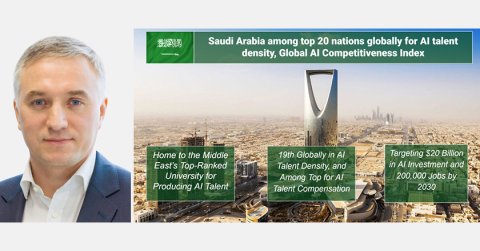
Beijing — Saudi Arabia and the United Arab Emirates have ranked among the world’s top 20 nations for AI talent density, surpassing countries such as Italy and Russia, according to the latest Global AI Competitiveness Index. The UAE and KSA hold 0.7% and 0.4% of the global AI talent pool, respectively, marking their emergence as rising powerhouses in AI innovation.
The study is a collaborative effort between the International Finance Forum (IFF) and Deep Knowledge Group (DKG). The IFF is a non-profit, non-governmental organisation founded in October 2003 by G20 countries and international organisations, including the United Nations, the World Bank, and the International Monetary Fund. DKG is a leading global think tank specialising in AI research and innovation, focusing on fostering advancements in technology, healthcare, and other strategic industries.
In a groundbreaking achievement, King Abdullah University of Science and Technology (KAUST) has entered the top 150 universities globally for producing AI talent, becoming the highest-ranked university in the Middle East. This success is a direct reflection of Saudi Arabia’s aggressive push towards establishing itself as a global leader in artificial intelligence.
Saudi Arabia has invested $20 billion in partnerships with top universities like Stanford University to build KAUST, which houses one of the world’s leading AI research labs. In addition, programs such as 10,000 Coders aim to train young Saudis, equipping them with cutting-edge AI skills.
“This report is the third in a series of reports on the Global Competitiveness Index for AI, published by the IFF. Since November, we have issued reports focusing on the development of global AI institutions, as well as AI research and innovation. Building upon the insights from the first two reports, this edition highlights talent as a key driver of algorithmic products and scientific research patents. Talent is also crucial in balancing the technological benefits and risks of AI. Our aim is to create a comprehensive understanding of the global flow of AI talent and conduct case studies on countries where AI talent is concentrated, providing valuable insights for all stakeholders in the AI industry. In future reports, we plan to explore the development of global AI markets and policy oversight, and we look forward to further in-depth analysis,” said Chu Jian, Data Expert at the IFF Research Institute.
Under Saudi Vision 2030, AI has been identified as one of the seven pillars of the Kingdom’s economic transformation. The goal is for Saudi Arabia to rank among the top 10 countries in AI research and application by 2030, attracting $20 billion in AI investments and creating 200,000 high-tech jobs. Saudi Arabia has established the Saudi Data and Artificial Intelligence Authority (SDAIA) to drive the national AI strategy. Major AI projects benefit from an expedited approval process, with decisions typically made within 30 days.
“AI talent, in terms of human capital, is the most precious asset for all future economies, which will inevitably intensively depend on AI technology,” said Dmitry Kaminskiy, General Partner at Deep Knowledge Group.
“Saudi Arabia and the UAE’s strategic focus on AI, their significant investments in education, infrastructure, and innovation, and their ability to attract top talent and investments are setting the stage for a new era of growth in the region. Both nations are making substantial strides toward becoming global AI leaders, with the UAE positioning itself as a major player in AI governance and technology, while Saudi Arabia is building a robust ecosystem for AI talent and applications,” added Kaminskiy.
Sovereign funds are fuelling growth in AI, with the Saudi Public Investment Fund (PIF) launching a $1.5 billion AI investment fund. The Kingdom is also investing heavily in projects like NEOM, where AI infrastructure accounts for over 30% of the $500 billion budget, setting a new standard for smart city development.
Saudi Arabia offers AI talent some of the highest salaries globally, with top scientists earning a median annual salary of $420,000, tax-free. NEOM also offers up to $5 million in signing bonuses for AI leaders, alongside full subsidies for their children’s education.
Saudi Arabia has introduced special residency schemes and relaxed cultural restrictions in zones like NEOM, enabling foreign experts to live and work under conditions that blend their lifestyle with the Kingdom’s cultural fabric. NEOM’s The Line city will be the world’s first AI-controlled city, with services like transportation and energy managed entirely by AI. The city’s vast data collection and biometric monitoring will provide unparalleled opportunities for real-world AI development.
“Nations that invest in AI talent today are not just shaping their digital future; they’re securing their global competitiveness for decades to come”, concluded Professor Patrick Glauner, Coordinator of the IFF AI Committee.
Saudi Arabia’s efforts to bridge the gap between the East and West have positioned it as a “neutral zone” for global AI innovation. The country’s relationships with both China and the United States make it an attractive destination for technology companies and talent seeking a politically neutral environment.





